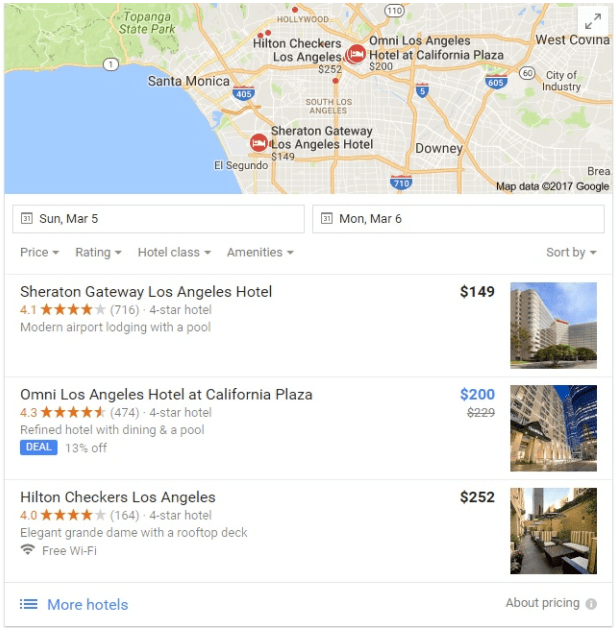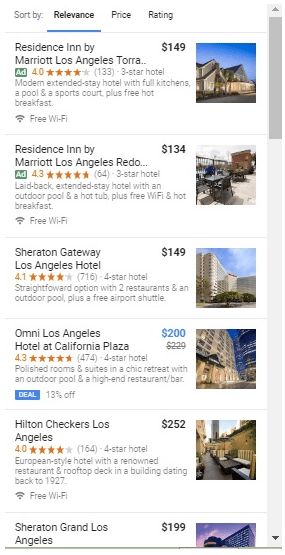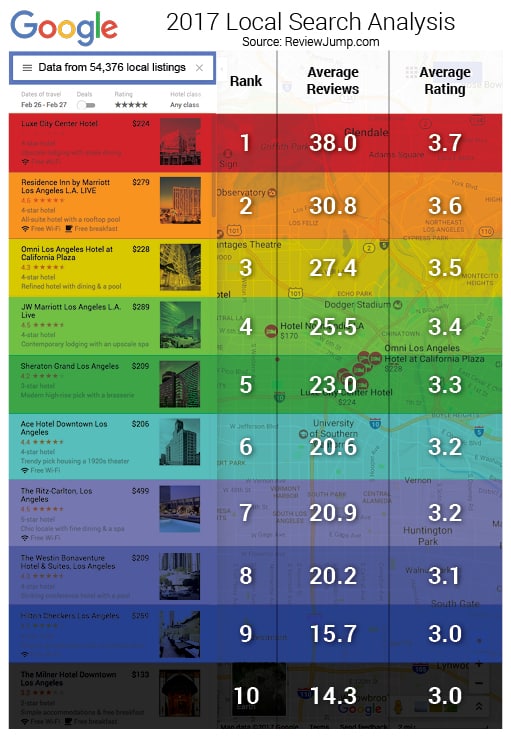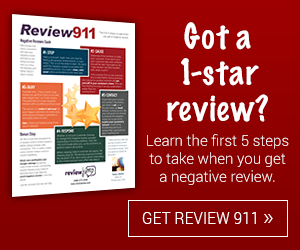

In late 2015, I conducted and published my first exhaustive local search analysis. If you’ve spent any amount of time working in and around Google, you know things change pretty quickly– so it was time for an update.
I recently finished my 2017 local search analysis, and the results surprised me. As it turns out, Google’s local search is more competitive (and more linear) than ever before– but I also confirmed my theory that there’s one solid way to compete in the local search results.
More online reviews and better ratings.
By local search, I’m referring to the local pack. As an example, when you first enter a search for ‘Los Angeles hotel,’ it currently looks like this:

When you click ‘more hotels,’ it looks like this:

This “local pack” is what I’m referring to when I talk about local search. These are the most prominent results on any Google search engine results page (SERP) for a local-focused query, and it’s where your potential customers are likely to click.
It’s a quick, easy source of information and reviews for the user. If your business isn’t featured prominently in the appropriate local pack, you’re missing out.
Before I get into my findings, and what they mean for you, I want to tell you a little bit more about my research. If you don’t care about my methodology, please feel free to skip to the second section of this article.
Local Search Analysis Methodology
I found a lot of interesting data points in my research. I ended up analyzing over 1,300,102 local reviews, 54,376 local listings, and 5986 SERPs.
Since it’s the most widely used search engine (by a large margin), I decided analyzing Google’s local search results would yield the most useful data– both for me, and for you.
My team and I captured the quantity and rating of reviews for each top-10 listing across 41 unique keyword searches, and across and 146 U.S. cities. As a result, the statistics in this article are correlations based on captured data for over those 1.3 million reviews.
It’s a lot of data.
This post won’t focus on every interesting data point I found. Instead, this article focuses on what probably matters the most to anyone interested in search engine visibility and online reputation– how to compete in Google’s SERPs, and why online reviews matter.
Quantity + Rating = Ranking
Here’s what I found– both review quantity and overall star rating (out of five) affect the overall ranking for a business’ listing.
Now, keep in mind that Google’s search algorithms use many different key indicators to rank business listings. We don’t even know what all of those indicators are, and we never will. But I feel that data stretching across 54,376 business listings proves a strong correlation between reviews and search engine visibility.
So, in essence, more reviews and better ratings help your rankings.
I analyzed 10 listings per city for each keyword, or industry, I included in my study.
My analysis found the highest-ranked listings on Google’s local search results have an average of 38 reviews. While on the flip side, the lowest ranking business listings have an average of only 14.3 reviews.
Higher rated listings also rank better. The closer a listing is rated is to 5-stars, the more likely it is to rank at the top of local search results. The top-ranked listings on Google’s local search results have an average rating of 3.7-stars, while the tenth-ranked listings have just 3.0-stars.
So, 0.7 stars might not seem like a lot, but those small decimal amounts seem to make or break local listing rankings. This infographic I put together may prove my point more quickly:
How to Compete in Local Search Results
Basically, the more reviews you have, the higher rated you are, the more likely you will rank at the top of Google’s local search results.
None of this is set in stone, of course. Search engine results are always changing, and Google is always working behind the scenes in ways we’ll never understand. You’ll also need to make sure you optimize your Google My Business profile and build your local citations.
While there are no absolute guarantees when it comes to achieving search engine visibility, I believe my research shows a compelling correlation between review quantity, review ratings, and ranking in Google’s local search results.
Closing Thoughts
If you’re not sure how to get more reviews, you can always ask your customers. Or, alternately, there are software solutions to help you. If you sit and wait for the reviews to come in without taking action, you’re leaving out an important component to competing in the local search results.
You may not be facing formidable competition like hotels in Los Angeles, but review quantity and rating still affects your overall search rankings. To stay competitive in Google’s local SERPs, you need to earn more honest reviews from your real customers.
After completing this huge research project, I realized that it’s still possible for businesses to compete in local search. It’s a tight race, and often a very slow race, but every decimal point matters.
It’s time to step out of the shadows!
Thanks for reading!
-Brodie








Comments are closed.